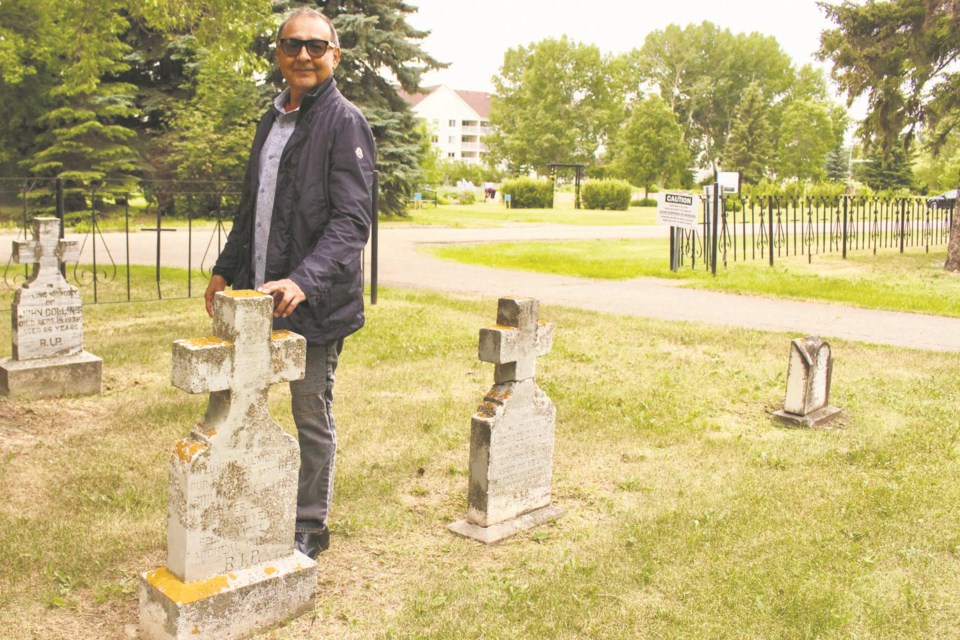St. Albert - The local St. Albert and Sturgeon County Métis community will begin the ground truthing process, looking for unmarked graves at five sites across the city.
Bruce Gladue, president of the St. Albert-Sturgeon County Métis Local 1904, said there will be five sites searched across the community for grave sites related to the St. Albert Youville institution attended by many Métis children. Youville was one of two residential schools in St. Albert, along with the Edmonton Poundmaker school, which is located adjacent to Riverlot 56.
“It’s very emotional,” Gladue said.
“I saw a sign that said ‘They found me,’ which is basically what happened, and that alone is so powerful,” Gladue said in reference to the discovery of the hundreds of unmarked graves of Métis and Indigenous children discovered across Canada in recent weeks.
The Métis community will be spearheading the search of the five sites, with two by the Greater St. Albert Catholic School Board’s continuing education centre near Seven Hills, and close to the location of the Youville children’s institution.
Gladue said the school board reached out and asked if the Métis community would be able to search the area for graves before they proceeded with the planned paving of the area for a parking lot. The City of St. Albert also contacted the Métis local with the same request for an area adjacent to the learning centre.
“We have no records of historical or oral history that there are any unmarked graves on both sites. The superintendent is erring on the side of caution and wants to make sure, and the city also wants to make sure on the other parking lot,” Gladue said.
The Métis community will also be searching an area near Big Lake, which may have unmarked graves related to the Youville school, along with a spot right near the former school grounds.
“From our understanding it was an old grave site in that area,” Gladue said.
Riverlot 56 will also undergo ground truthing, with the possibility of finding unmarked graves on that site, too.
“There may be some children from Poundmaker (who) may have been there, but also Youville as well,” Gladue said.
Gladue said they expect to find some graves during the process, but he can’t say for certain until they start looking.
“In terms of the children, you hope not,” Gladue said.
The undertaking will have protocols in place in case remains are found, and all locations have been selected after consultations with knowledge keepers.
The situation is fluid, Gladue said, and more sites could be added if there is reason to believe there may be graves in the area.
“And so now with what's happening and what is coming out, you feel the effects like a death and grieving,” Gladue said, adding there is power in being able to talk about the atrocities, and to have evidence to prove they happened, and that it isn’t just an old wive's tale.
Gladue will be working with Dr. Kisha Supernant, director of the Institute of Prairie and Indigenous Archaeology at the University of Alberta, to use ground-penetrating radar to find any remains in the areas.
For the locations the city and school board asked to have searched, both organizations will pay a fee for the services. For searching in Riverlot 56 and near the Youville school, Gladue said they will try to access government money to fund those projects.
While finally getting to search for the community’s missing children is important, Gladue said self-governance is the way forward for the First Nations and Métis communities in the country. Gladue said the Métis community also needs more recognition and respect, and noted the Metis Nation of Alberta had to sue the United Conservative Party government over a refusal to discuss consultation policy.
“The only way out of this is for us is for us to take over our own programs and services. We need to provide our own education. We need to provide our own child welfare. We need to provide all that housing for our people, and we've got to accelerate our self-government. That's what I think has to happen,” Gladue said.
Gladue said the need is there because systematic racism still exists in current government structures.
“We need the freedom to recover from this.”



